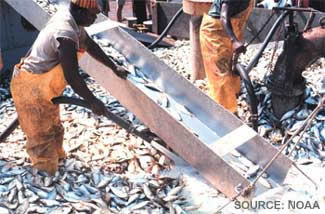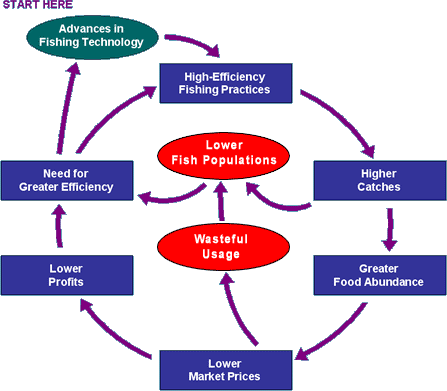|
One may wonder how the world's fishermen have seemingly caused such a large overfishing problem. Can people using boats, canoes, kayaks, spears, nets, and fishing poles really be going that far over fishing limits? Can weekend sportsmen really catch that many fish—can the Pocket Fisherman be that good?
Individual and communal fishing activities, of course, are not the big problem when it comes to overfishing—high-tech fishing fleets are. But you would think even commercial fishing fleets would be smart enough to know that overharvesting what's in the world's oceans will eventually cause them to go out of business.
Today we take a quick look at the problem of overfishing and explore how it is that fishing operations seem bent on self-destruction.
 In 2003, widespread overfishing was one of the major findings of the final report from the Pew Oceans Commission, which noted that the numbers of fish within many prime species have been significantly reduced by the use of high-tech fishing practices that deplete fish stocks, degrade nursery areas, and produce wasteful bycatch. This year, another study funded by Pew found that predatory fish populations, including shark, tuna, and North Atlantic cod, continue to spiral downward, with many species dropping 90% or more in the past 40-50 years.
In 2003, widespread overfishing was one of the major findings of the final report from the Pew Oceans Commission, which noted that the numbers of fish within many prime species have been significantly reduced by the use of high-tech fishing practices that deplete fish stocks, degrade nursery areas, and produce wasteful bycatch. This year, another study funded by Pew found that predatory fish populations, including shark, tuna, and North Atlantic cod, continue to spiral downward, with many species dropping 90% or more in the past 40-50 years.
In 2004, the US Commission on Ocean Policy reported that "25% to 30% of the world's major fish stocks are overexploited and that US fisheries are experiencing similar difficulties. Of the nation's 267 major fish stocks ... roughly 20% are either already overfished, experiencing overfishing, or approaching an overfished condition."
In 2005, a study by the Food and Agriculture Organization of the United Nations found that global stocks of most fish are stretched to their limits. Nearly a quarter of commercial species have already been over-exploited, with a total 70% of species now being fished close to, at, or beyond their capacity.
Many people around the world still use traditional, relatively low-tech approaches to fishing, with a large number of people fishing for subsistence purposes. But the big share of the fish being plucked from the world's oceans are caught by industrial fishing fleets. Over the last few decades, commercial fishing boats have gotten super-sized and outfitted with an amazing array of sophisticated gear for locating fish, catching fish, and even freezing and processing fish right onboard.
But even with this increase in efficiency and capability, would it not behoove these large operations to manage fish stocks in a way that does not deplete their primary resource and eventually cause their businesses to founder? Well, if they all worked together as a team, yes. But they don't—they operate as individual companies and within a generally uncoordinated multi-nation framework. In other words, companies and countries are competing for the world's fishes, and there is little incentive for any individual entity to catch fewer fish. Consider the following chart.

Advances in fishing technology make possible high-efficiency fishing practices. This results in higher catch levels and greater food abundance, pushing market prices lower. The lower market prices mean fishing operations make less profit and consumers and retailers waste more fish because waste is less economically detrimental at the lower prices. The increased wastefulness and the higher catch rates lead to lower fish populations; this, combined with the lower profits the fishing operations now garner, causes a need for ever greater efficiency in fishing operations. This drives further increases in fishing-fleet technology, and the whole cycle starts again.
Starting from the upper left and moving clockwise, we can see that there is a vicious cycle. As catches or market prices decline, individual fishing operations ratchet up their activities to try to compensate and maintain profitability. The cumulative effect is disastrous.
When thinking about possible solutions to the overfishing problem, it may initially seem that the problem is simply that we are pulling too many fish out of the sea. That's certainly a big part of it, but there are a number of other factors to consider as well:
- the unintentional removal of non-targeted species during fishing operations (bycatch),
- destruction of coastal and ocean-floor breeding habitats,
- pollution, and
- climate change (global warming).
All of the recent studies on our ocean problems recommend a comprehensive, ecologically based approach to fisheries management, not just simply trying to limit catch numbers. Let's hope that our governing officials have the wisdom to follow this advice.
As consumers, one thing we can start doing immediately is choosing fish for our dinner plates that are not in danger of being overfished. The Monterey Bay Aquarium has a nice resource page about overfishing and related problems, and they also have best-fish/worst-fish pocket guides by US region. There's also Environmental Defense's "Oceans Alive" seafood guide.
Do you know a seafood lover who might be interested in this overfishing article? Please forward it to them ...
Books:
Related articles:
HATE MAIL FROM SOME FLOUNDER
Mercury in Fish—Which Fish, and Why?
“ORGANIC SALMON”—JUST ANOTHER FISH STORY
Is "Organic Salmon" a Certified Sham?
More articles and resources on....
Get Grinning Planet free via email
|


